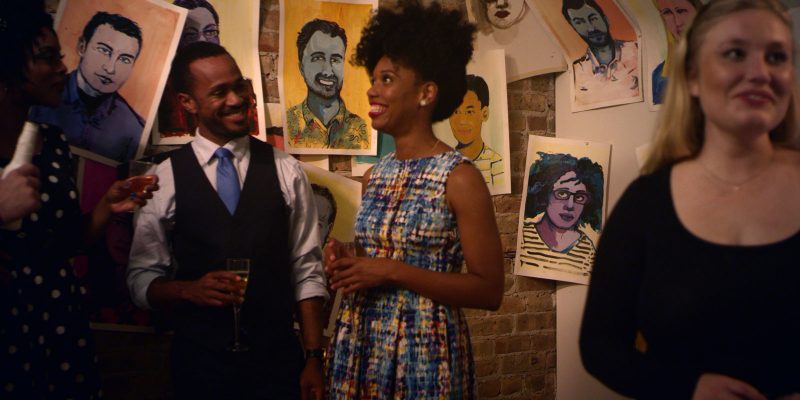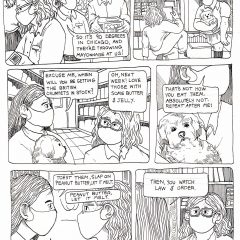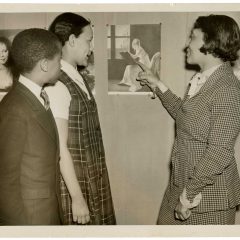
Vincent Van Gogh, Pierre-Auguste Renoir, Camille Claudel, Frida Kahlo, and Jean-Michel Basquiat are some artists that have dramatic biopics and documentaries made about them. American Splendor, Ghost World, and Art School Confidential offer indie spirited depictions of art school life. However, black women visual artists have yet to have their stories told. Gregory Dix’s Olympia seeks to remedy that, bringing forth a refreshing perspective that taps into the role of the artist after the thrill of art school is over and real life problems escalate.
The Chicago based film opens on Olympia’s crowded solo gallery reception. In a stylish, patterned dress with tamed afro curls and bold red lipstick, she proudly watches the guests drink wine and admire her quirky portrait paintings. It is a sweet, tangible picture that an artist desires– the splendid thrill of being a celebrity for the evening with work lauded and potentially bought. Suddenly, the alarm interrupts and snuffs out the fantasy.
The reality is that Olympia is a young, struggling artist running late for her receptionist gig again. At work, her stern boss scolds her for tardiness, a rejection from an art show sits in her inbox, and doodling alongside an active imagination keeps her occupied. Random people, including strangers often compliment her drawings, always saying with awe, “I wish I could have that hobby” or “I stopped drawing in the eighth grade.” The hidden meaning is that maybe Olympia should pursue a more worthwhile path.
Olympia raises the question on what comes next in the middle ages for artists, especially post college artists with only student loans to show for their artistic merit. After art school, artists face an uncertain future, left dreaming about obtaining instant success rather than reveling in the moments often perceived as failure. Thus, the film is not afraid to break down the artist’s fictional timelines versus the cold, hard facts that they will not be rich and famous by a certain age. To Olympia, the obstacle of time presents a miserable limbo, waiting in the wings for her talent to be noticed. Her impatience for notoriety weighs on her physical, mental, and emotional anxieties as well as her dismal financial situation, speaking on the significant identity crises most artists currently endure.
Furthermore, Olympia’s close inner circle affects her turmoil. In the art world, sometimes people reach the achievement mountaintop at different stages– often not at the same time. Olympia sees that everyone is reaching their goals and she is stagnant in hers. Grace, her older sister is happily married and raising a son with her wife, AJ. Jemma, her best friend accepts a great writing opportunity in New York City. Felix, Olympia’s boyfriend, is a musician turned employee at a startup company that pays well. Unlike Olympia, Felix has temporarily retired his creativity for the pursuit of adulthood status. He symbolizes a sensible outlook that many artists latch onto after realizing creative ambitions are either too expensive or too daunting. He turns to this job out of both duty and doubt.
Olympia and Felix’s relationship is reminiscent of urban classic Love Jones finely threaded with the notes of recently released If Beale Street Could Talk. The love between these three couples is prolific, passionate, and vulnerable. However, Olympia and Felix have opposing parallels about their individual art practices. Whereas Olympia remains idealistic and hopeful, Felix has practically given up music. Although he sings a lovely ballad at Olympia’s thirtieth birthday party, art has become hobbyist for him and Olympia still draws every day. When Felix’s company plans to move to California, Olympia has to choose between remaining beholden to familiarity or putting down roots in a new city.

Angie and Olympia’s tender mother/daughter relationship explore the beginnings and ends to artistic avenues. The characters are alike in the way they visualize success. The cancer has taken a toll on Angie’s mobility and she is only able to leave the hospital room through the poignant vignettes existing in her mind. In gorgeous costume and carefully applied makeup, Angie graces the stage to a full, attentive audience. She stands and holds the microphone, ready to sing. Olympia’s hospital visits to a dying Angie feed Olympia’s desire to stay in Chicago and drown in Angie’s regrets. Angie, however, is the mature authority that encourages Olympia to follow her dreams, to not stay on the path of uncertainty. Olympia refuses to let go.
Olympia’s reluctance then pours into Jemma’s self-doubt and makes the young writer believe that moving to New York City was too huge a risk. This reveals the pros and cons of how creative friendships inadvertently influence each other. Jemma’s fears and doubts are no fault of Olympia’s, but Jemma uses Olympia’s choices as a crutch to her own insecurities. Although Olympia and Jemma will miss always living three minutes away, the best friends know that the healthy distance is a part of growing up and moving forward with their creative endeavors.
McKenzie Chinn, a poet, writer, and educator, stars as Olympia and wrote the script. Chinn’s exceptionally brave and believable rendering of Olympia shapes the existence of the black woman artist fighting to make it in a tough, confined world. In one pivotal scene, Olympia rips a picture of her parents, tapes it back together, and draws and paints the image. Just the act of a black woman drawing and painting is monumentally beautiful and resonates. Chinn also stars in Animator– a film about an artist whose drawings can change the future and delete the past.
Olympia delivers a tenderhearted fiction intertwining humorous animation, euphoric background music, and brilliant color schemes; bridging romance, drama, and visual art with captivating urgency. This hip, authentic film candidly illustrates the plight of the impoverished artist in contemporary society through the small triumphs and pitfalls of Olympia– a constant drawer/doodler/painting heroine whose work is finally visible and valid.
Olympia screened at Lightbox Film Center on Sunday, March 17th as the centerpiece film for the Fifth Annual Philadelphia Women’s Film Festival. For more information about the film, and to find out how you can view “Olympia,” visit the film’s website.









